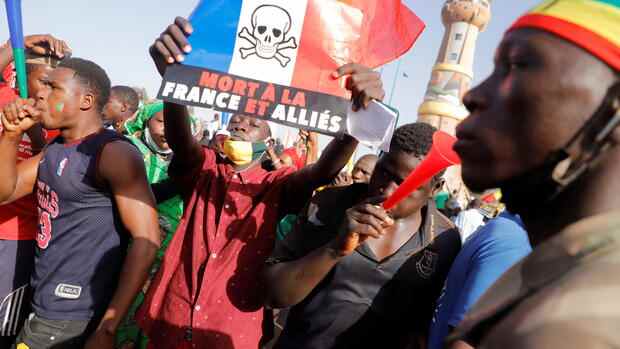The anti-terrorist mission led by France is on the brink of collapse.
(Photo: REUTERS)
Paris France, its European partners and Canada are withdrawing their troops from Mali. They announced this in a joint statement that the Élysée Palace published after consultations in Paris on Thursday. It was said that the aim was to remain active in the Sahel zone.
For weeks, French government officials had indicated an end to the Barkhane military operation against Islamist militias in Mali, which had been running for nine years. The anti-terrorist mission Takuba, in which special forces from several European countries are involved, is thus on the brink of collapse.
Numerous heads of state and government from Europe and Africa are gathering in Brussels today, Thursday. Emmanuel Macron hopes that the two-day meeting will establish a “new partnership” between the two continents. The EU-Africa summit is to be a foreign policy highlight of the French EU Council Presidency.
But France’s president also has to deal with an uncomfortable chapter in Africa policy: the military operation in Mali. Macron, who likes to talk a lot about a sovereign Europe, pulls the ripcord on France’s engagement in the West African civil war country. This should also have consequences for the Bundeswehr soldiers stationed there.
Top jobs of the day
Find the best jobs now and
be notified by email.
On Wednesday evening, Macron discussed further action in the Sahel region, which stretches south of the Sahara from the Atlantic to the Red Sea, with representatives of European and African countries. EU Commission chief Ursula von der Leyen and EU foreign policy chief Josep Borrell also attended the dinner at the Elysée Palace.
For Germany, the question arises more than ever as to how the foreign deployment of the Bundeswehr in Mali should continue: More than 1,300 soldiers are stationed there as part of the EU training mission EUTM and the UN mission Minusma. However, German troops are not involved in the Takuba operations.
The Bundestag must extend the Mali mandate on June 1st. Defense Minister Christine Lambrecht (SPD) recently expressed “great concerns” about further engagement. After the military coup in Mali, elections must be held quickly, and the protection of German soldiers must be unconditionally guaranteed. In January, those in power in Bamako denied a Bundeswehr aircraft overflight rights.
Sahel test case for Europe
With the end of Barkhane and Takuba in Mali, the former colonial power France and its allies are drawing the conclusion from the shattered relationship with the military government in Bamako, which seized power with two coups in 2020 and 2021. Relations had deteriorated rapidly again in the past few weeks, and the French ambassador was expelled from the country. In the Élysée it was said that those in power in Mali were on a “confrontational course with their regional and international partners”.
According to information from Élysée circles, the anti-terrorist fight in the Sahel should continue, and the French soldiers could be stationed in one of Mali’s neighboring countries. “However, the transfer of French forces to another country raises question marks,” says Africa expert Thierry Vircoulon from the Paris think tank Institut Français des Relations Internationales (Ifri). The French-led combat operation is unpopular in the entire region.
Rising tensions had received little attention amid fears of a war between Russia and Ukraine. But here, too, the stakes are high: the Sahel is a test case for Europeans’ ability to create stability in their neighborhood on their own.
Despite the French-led operation, the security situation in Mali has become more precarious in recent years, says Vircoulon. The crisis is increasingly spreading to neighboring countries such as Niger and Burkina Faso. Not only Islamists, who are the focus of European attention, took part in the fighting, but also other rebel groups.
The Sahel has also become a sideshow of the dispute with Moscow. “The failure in Mali allows Russia to distinguish itself at the expense of the Europeans,” says Vircoulon. Moscow is presenting itself throughout the region as an alternative to France and the EU.
Mercenaries from the Russian security company Wagner have taken up residence in Mali and neighboring countries. The Kremlin rejects any connection. The military leadership in Bamako hired a private company, said Russian President Vladimir Putin.
For Paris, on the other hand, the mercenary group is an actor sent by Putin. Wagner is to receive logistical support from the Russian army. In the Élysée Palace it is said that the mercenaries are becoming more and more integrated into the structures of the Malian army and that they are using “brutal methods”. The conditions for military cooperation with Bamako no longer exist.
More: How Putin is challenging the West – and why he could be successful with it
